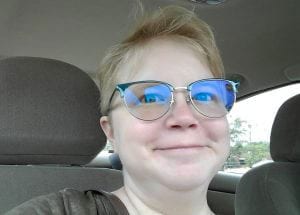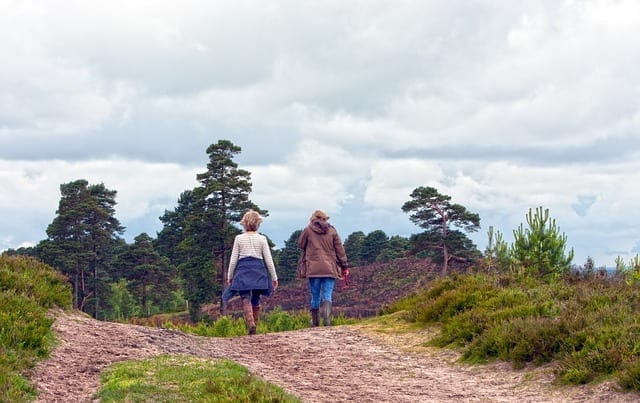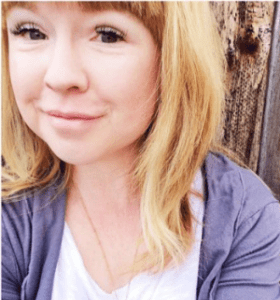Because I will be looking for a job from a rare but certainly not unique place of being, I decided to reach out to a mentor who lives with the same disease as I do. She had also experienced similarities in education and workplace. I knew, in talking with her, that I could expect certain similarities in my future as a disabled female contributing to my community.
Her name is Paula and she has a degree in elementary education. I have a degree in secondary education. We both live with the rare genetic disease cystinosis. Cystinosis causes every cell in our bodies to accumulate crystals due to our lysosomes not recycling the proper protein and nutrients to the various body organs and systems as they should. Paula has dealt with multiple kidney transplants (she is my senior by 17 years), but I have only dealt with one thus far in life. We also both live with diabetes which is due to being kidney transplant recipients. Something that is different in our health history is my cancer history which is something that 5% of solid organ transplant recipients are at risk to manage.
When I talked to Paula, I discovered that we had followed similar paths right out of college. Even though our paths were in different decades (hers being in the 1990s and mine being in the 2000s), we both qualified to use our father’s insurance until age 26. Then, after college for her and during my first college degree for me, we applied for Social Security Income.
Social Security Income is the United States safety net for the elderly, disabled, and spouses and children whose spouse/father has died. For people with disabilities, depending on their prior work history in the system, they can also receive Medicare. I never qualified as I never worked Medicare paying jobs at that time, so I was put on Wisconsin’s Medicaid program. Paula qualified for Medicare and paid for premiums but never did use this for her healthcare coverage.
When Paula first graduated from college, there weren’t a lot of teaching positions available to her and she became interested in a company called American Girl. They liked to hire teachers because of the number of public schools and home schools that requested their curriculum. Paula took the job for the medical benefits. She told me, “I didn’t tell anyone at the company about my health problems because at the time I was able to hide them.”
Even when she applied for a promotion within the company, she didn’t reveal her health history, although she figured some people did notice the way her hands looked. An aspect of living with cystinosis is muscle wasting, which starts affecting the hands, voice, and throat muscles in its progression.
Once she found out she needed another transplant due to a previous transplanted kidney failing, she was forced to tell her boss about her medical history to plan days off of work. She made it clear to me that if it weren’t for the fact that her boss had a disabled child living at home, she probably wouldn’t have received the understanding accommodation she needed in taking time off from work. When she was in good health, she worked a lot of extra hours as she felt the time she was asking for off put extra work burdens on her coworkers and boss.
There was one additional time in particular when she talked about requesting accommodation during a job: getting a keyboard for her wrists to rest on for typing. She needed the option of slanting her hands downward in order to get work done. This employer told her that she of course could get that accessible work tool.
Paula said to me,
“I can’t prove I’ve ever been discriminated against in the workplace, but I can feel it. Because my voice started becoming softer due to disease, as well as my short height and small presence in the room, I was different than the person they usually picked for certain job promotions.”
At American Girl, Paula received phone calls from libraries and teachers requesting American Girl curriculum as well as phone calls about the magazine. She did receive a promotion as head of the training department. She wrote training modules for the training programs as well as assisted others in writing them. Because she was making friends at work, a little more of her health history was revealed over time.
After Facebook started, her life was more transparent to those around her. This is when she told me the story of others getting promotions when she wasn’t getting promotions.
Paula and I could relate to so much in our interests and degrees in education and also in feeling more comfortable in smaller groups or working for other people. I haven’t had the experience of working for a company like Paula has, as most often I don’t take jobs because SSI will only cover my medical benefits if I make less than $86 per month. The monthly SSI payments get cut after I report higher income.
When I have asked interested employers about paying me less or providing unpaid internships, it is always a refusal because of company policy. It’s quite frustrating as I am an educated woman who is skilled at the work I can do and accomplish. I have taken little things like writing for online rare news, running my own rare news curation blog, and volunteering in my community, but I am dependent on able-bodied parents to shelter, feed, and clothe me as a grown adult.
Obviously, the United States system of government aid for the disabled, elderly, and bereaved could be better. Getting rid of the cap on income would immensely change the equity of my situation to equal my peers. An especially valuable change would be if SSI would start letting those of us who are disabled or our families save money for our livelihood without losing our medical benefits. Being able to have valuable assets is a privilege I will not get unless healthcare and disability care in America changes.
When Paula worked a part time job after college, she also took subbing positions as a teacher. She could decline a subbing job if that put her over the SSI cap. After she took the job as Supervisor for American Girl, she went off of SSI as she started to have to pay back some SSI and then eventually no longer qualified for SSI.
I am at the mercy of a system that has no consideration for the full lives that disabled people live and desire to live on the spectrum of wellness and illness for life.
I participated in Disability Advocacy Day in Madison, WI in 2019 to try to explain to legislatures that their vote on healthcare issues impacts their economy and equality for those living with disabilities as much as the elderly and bereaved. Oftentimes, our population group is seen as less valuable and worthy due to our perceived “non-worker” status. It is a stigma.
I really believe politicians and educators and employers need to know the reality of disability and be as accommodating as they are for able-bodied individuals in the workforce.
 About the Author: Rebekah Palmer is the author of two books published by Aneko Press: A Letter to my Friend and A Letter to Myself. They are both available on Amazon as well. She also has poetry included in the anthology Strength: Lives Touched By Cystinosis. Please visit her author profile on Goodreads and her author page on Facebook called Jairus Daughter to ask any questions or to reach out.
About the Author: Rebekah Palmer is the author of two books published by Aneko Press: A Letter to my Friend and A Letter to Myself. They are both available on Amazon as well. She also has poetry included in the anthology Strength: Lives Touched By Cystinosis. Please visit her author profile on Goodreads and her author page on Facebook called Jairus Daughter to ask any questions or to reach out.




